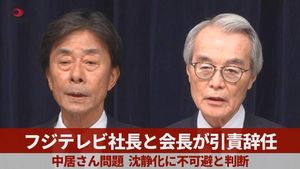Sumida Riku, the popular social media influencer, found himself at the center of controversy after making several statements online deemed inflammatory and insensitive by his followers. Social media users swiftly expressed their dissatisfaction, leading Riku to issue apologies to those offended by his comments.
Recently, Riku shared thoughts on trends within the influencer community and how they impact young followers. While his intent might have been to encourage open conversation, the delivery came across as tone-deaf, promoting backlash from his audience.
The backlash was immediate, amplifying on platforms like Instagram and Twitter, where critics highlighted the need for influencers to be more mindful of their words. Some supporters called out what they saw as overreaction, asserting Riku’s intent was misunderstood.
"I didn’t mean to offend anyone, and I deeply regret my words," Riku expressed through social media, attempting to clarify his stance and smooth over the controversy. Reports show his apology was met with mixed reviews, as many still felt the original statements warranted greater accountability.
One notable response from the public read, "People need to understand the impact of their words online," emphasizing the weight words can carry and the responsibilities influencers bear toward their audience.
This incident does not exist in isolation. The dynamics of social media interactions often create environments where miscommunication can spiral quickly. Influencers, who are expected to communicate with transparency and authenticity, can find themselves facing intense scrutiny when their messages are misinterpreted.
Riku's experience serves as another cautionary tale for influencers trying to navigate the complex waters of social media etiquette. The power dynamics between influencers and their followers highlight how easily public trust can be shaken.
While some fans rallied to support Riku, encouraging him to learn from the incident, the sentiment of accountability has grown strong within digital communities. This push for responsible content creation is echoed across platforms, transforming conversations about social media conduct.
Looking forward, Riku's next steps will involve repairing his public persona and ensuring future communications are sensitive to the diverse interpretations by his audience. This incident surely will linger as Riku embarks on redefining his approach to content.
Significantly, this marks another chapter in the dialogue surrounding influencer responsibility and the imperative nature of mindful engagement within the community. Riku’s regret and the surrounding discourse present opportunities for education, reflection, and growth, establishing expectations for future influencers.
Indeed, the impact of Riku’s statements, the resulting backlash, and his sincere apologies could resonate beyond this moment, perhaps influencing how future influencers convey messages through their platforms. The lesson here rings clear: with the privilege of influence come the responsibilities to communicate with care and respect.
Riku’s saga continues as he reflects on the lessons learned and what they mean for his future interactions within the influencer space. To emerge stronger and more aware, he needs to embody the change he wishes to see, ensuring his platform serves as one of encouragement and positive discussion.



